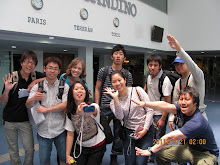I was wading through a pile of papers in my office today and found one piece of paper with notes written on it in my handwriting. I started reading and remembered that I had carefully saved this piece of paper because I wanted to use the notes to make a post in my blog on the topic.
Last October (2011), I was privileged to have Dr. Naoyuki Kawahara give a guest lecture in the Global Medicine class that I facilitate. This was the second time Dr. Kawahara had come to my class and once again I was very impressed by his heart.
Dr. Kawahara is quite famous in Japan for his work in Sudan in Africa. His NPO, Rocinantes, has been giving much needed medical care to the people of Sudan since 2005. Before starting his NPO, he worked as a doctor to the diplomats of the Japanese Ministry of Foreign Affairs in Africa. But in 2005, he gave up his job with the Ministry in order to care for the people of Sudan full time. His wife and children returned to Japan and Dr. Kawahara began the long journey down the rough road of trying to do what his heart told him was right--to care for the suffering people he saw right in front of him in Sudan.
Dr. Kawahara told the students, "Try to not think too much [when making your decision to do something]". I was reminded of the popular Nike commercial "Just do it." I knew that he was trying to make them understand how easy it is to sort of talk ourselves out of doing something when we start over-thinking things. It is, perhaps, human nature to start thinking of all of the negatives and forget the real need that is there to be filled. He also told the students, "There is a light shining among the poor and needy. In Japan, we forget to be thankful and complain about little things."
He talked to the students about the importance of learning to diagnose and treat with only a stethoscope. Of course high tech MRI and CT scans are miraculous tools, but to most of the world's population these are not available. So, learning to diagnose without modern technology is a very important skill--one that can be lost if young doctors become too dependent on technology.
Dr. Kawahara's love for the people of Sudan has not stopped him from also jumping right in to the fray here in Japan when the great Eastern Japan earthquake and Tsunami took place. In fact, he was in Tokyo when the disaster took place and went straight to a hospital where he borrowed an ambulance and drove to an area hard struck by the disaster. Since then, his NPO has had a constant presence in that area. He told the students of the need to build trust with patients, sharing smiles and activities that can help them to gradually recover emotionally. He planted sakura (cherry blossom) trees with the people there and made promises to gather under the blooming trees in 20 years time to see how they've grown.
In conclusion, I would like to say that Dr. Kawahara has a very big heart. One of the most impressive things to me the first time I heard him speak was that he showed us a photo of his wife at the end of his presentation and said "This is my lovely wife. Without her I could not do what I do." Naoyuki Kawahara is a great man in many ways, but he is also a humble man who keeps a heart full of gratitude for those supporting him.
Thank you Dr. Kawahara.
Friday, July 6, 2012
Subscribe to:
Post Comments (Atom)

No comments:
Post a Comment